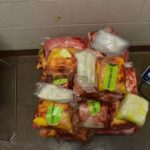

The Hidden Side of Sweet Chocolate: An Alarming Look at Ivory Coast’s Cocoa Smuggling
On the surface, there’s something intrinsically innocent about a bar of chocolate; it’s the ultimate symbol of sweetness and delight. Little do most people know the dark tale that lies beneath. Behind the velvety texture and the comforting taste lies a troubling story of illegal cocoa smuggling right from the heart of Ivory Coast, one of the world’s largest cocoa producers.
Cocoa’s Dark Secret: Involvement of Border Officials in Smuggling
Recently, a shocking revelation has surfaced. Ivory Coast’s army chief of staff has suspended five officials accused of aiding cocoa smuggling, according to a statement late Tuesday. The corrupt officials hail from the border town of Sipilou and include the town prefect, police commissioner, head of the armed forces detachment, gendarmerie brigade commander, and the head of the customs office. It’s grim news that those tasked with preventing smuggling are allegedly at the heart of it.
The Scale of Coco Smuggling: A Not-So-Hidden Issue
Entities on both sides of the border may bear some responsibility for the surge in smuggling. It’s estimated that between 50,000 to 75,000 metric tons of Ivorian cocoa have been smuggled to Guinea and Liberia since the beginning of the season in October. This is happening at an alarming rate, with outsiders unaware of the scale.
The Profit Bait: The Attraction of High Prices
What attracts smugglers is clear. In Guinea, trafficking is being fueled by the steep increase in world cocoa prices. The smuggling process involves paying corrupt authorities an average of 15 million CFA ($23,500) per trailer truck, which can hold up to 40 tons of cocoa beans, to turn a blind eye to their activities. This is a small price for the traffickers to pay, considering they have been attracting buyers by offering up to 5,000 CFA per kilogram of cocoa, much higher than the farm gate price of 1,800 CFA in Ivory Coast.
The Invisible Stretch: Impact of Cocoa Smuggling
How does this translate on the broader scale? The smuggling plague is eating the industry alive, with a noticeable decrease in cocoa making it to ports. While crackdowns like the recent suspension of officials could be good news, industry insiders believe it might be too late.
A Hard Truth: Little Hope for a Swift Resolution
Per Drissa Konate, a buyer in the town of Ouaninou, the lure of trafficking is simply too enticing for many. “Honestly, there is far too much money to be made in trafficking and I don’t see how we’re going to stop it,” he confessed. Traffickers find the promises of high returns across the border in Guinea difficult to resist, as compared to the comparatively lower prices within the Ivory Coast.
The Bitter End: A Call to Action
It’s a disheartening glimpse into an industry in decline, undermined by the very individuals tasked with protecting it. As the tale unfolds, exporting nations and importing nations alike must take firm stands against the illicit trade to ensure the sustainability of this rich, flavourful bean that plays a crucial role in economies, livelihoods, and the act of simply savouring a sweet treat.
Looking Ahead
Greater transparency, stricter regulations, and international cooperation are needed in the fight against cocoa smuggling. As consumers, we must also play our part in demanding fair trade and ethically sourced cocoa. Our luxurious chocolate treats might carry a far heavier price than we imagine.
Cocoa smuggling and corruption
The financial appeal of cocoa coin smuggling
The impact of cocoa smuggling on the global market
Actions are required to combat cocoa smuggling
Originally Post From https://www.reuters.com/world/africa/ivory-coast-army-accuses-anti-trafficking-officials-smuggling-cocoa-2025-01-15/

